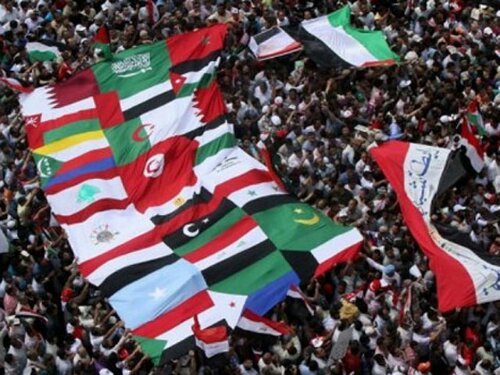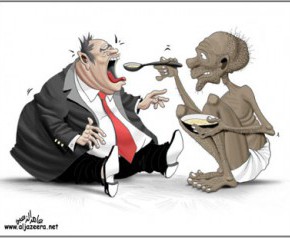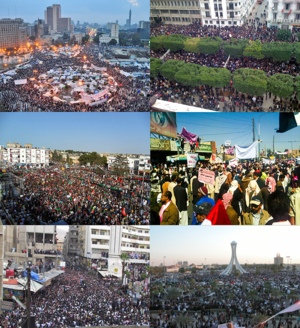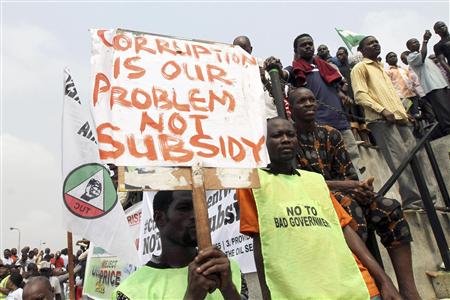The series of protests and demonstrations across the Middle East and North Africa that commenced in 2010 has become known as
the “Arab Spring”, and sometimes as the “Arab Spring and Winter”, “Arab Awakening” or “Arab
Uprisings” even though not all the participants in the protests are Arab. It was sparked by the first protests that occurred
in Tunisia on 18 December 2010 in Sidi Bouzid, following Mohamed Bouazizi’s self-immolation in protest of police corruption and ill
treatment. With the success of the protests in Tunisia, a wave of unrest sparked by the Tunisian “Burning Man” struck
Algeria, Jordan , Egypt , and Yemen , then spread to other countries. The largest, most organised demonstrations have often
occurred on a “day of rage”, usually Friday afternoon prayers. The protests have also triggered similar unrest outside
the region .
As of September 2012, governments have been overthrown in four countries. Tunisian President Zine El Abidine Ben Ali fled to Saudi
Arabia on 14 January 2011 following the Tunisian revolution protests. In Egypt, President Hosni Mubarak resigned on 11 February
2011 after 18 days of massive protests, ending his 30-year presidency. The Libyan leader Muammar Gaddafi was overthrown on 23
August 2011, after the National Transitional Council (NTC) took control of Bab al-Azizia . He was killed on 20 October 2011, in his
hometown of Sirte after the NTC took control of the city. Yemeni President Ali Abdullah Saleh signed the GCC power-transfer deal
in which a presidential election was held, resulting in his successor Abd al-Rab Mansur al-Hadi formally replacing him as the
president of Yemen on 27 February 2012, in exchange for immunity from prosecution.
During this period of regional unrest, several leaders announced their intentions to step down at the end of their current terms.
Sudanese President Omar al-Bashir announced that he would not seek re-election in 2015, as did Iraqi Prime Minister Nouri al-
Maliki, whose term ends in 2014, although there have been increasingly violent demonstrations demanding his immediate
resignation. Protests in Jordan have also caused the sacking of four successive governments by King Abdullah .The
popular unrest in Kuwait has also resulted in resignation of Prime Minister Nasser Mohammed Al-Ahmed Al-Sabah cabinet.
The geopolitical implications of the protests have drawn global attention, including the suggestion that some protesters may be
nominated for the 2011 Nobel Peace Prize . Tawakel Karman from Yemen was one of the three laureates of the 2011 Nobel Peace
Prize as a prominent leader in the Arab Spring. In December 2011, Time magazine named “The Protester” its ” Person of the Year “.
Another award was noted when the Spanish photographer Samuel Aranda won the 2011 World Press Photo award for his image
of a Yemeni woman holding an injured family member, taken during the civil uprising in Yemen on 15 October 2011.
Back in December 2010 , no one was aware that the suicidal gesture of a young Tunisian street vendor would trigger a tidal wave of
unprecedented popular uprisings in his country and others .
The media reverberations have shaken the whole planet. However, in Sub – Saharan Africa , the impact was more profound than in other
continents . There was a spontaneous identification with the popular protests going on in Tunisia , Libya, Egypt , etc. not only because of
the geographical proximity , but also because of the many similarities as regards the socio – economic and political situations , and the
deep -rooted links between the nations north and south of the Sahara .
A glimpse of hope for Africa ?
Many Africans were saying in whispers: ‘ If they can do it , why can ’t we do it too?’
When demonstrators in Tahrir square , Habib Bourguiba avenue, or Al Mahkama square (Benghazi ), shouted their anger against protracted
dictatorship, resources plundering by ruling party members , the Head of State and the First Lady’ s relatives , against sham elections ,
deterioration of health , education and public services , etc . many Africans felt they had been victims to the same evils for ages . Even
those countries with a degree of political and media pluralism coupled with formal electoral competition , were not immune from that
identification . Actually, the immediate and more pressing needs of the African populace is neither political pluralism nor fair and free
elections , but primarily : decent conditions of living , equitable resource distribution , equality of citizens before the Law , and above all :
jobs !
Joblessness , spiralling poverty and hopelessness are made more and more intolerable, in comparison to the unashamed luxurious life – style
of the regimes’ cronies .
It was no surprise,then , to see demonstrations, albeit limited , erupting in a dozen of African countries , with open reference to the Arab
Spring . Many Africans were saying in whispers: ” If they can do it , why can ’t we do it too ?”
As for the African governments , there was a real sense of anguish and even fear . In Eritrea and other countries, media coverage of the
popular protests was officially forbidden. In Zimbabwe activists were arrested for circulating videos of the Arab uprisings . In the republic
of Chad , senior military officers and members of the parliament , some of them from the ruling party itself, have been imprisoned [ Fr ]
for months , for allegedly plotting to overthrow the government through an ” African Summer” inspired by the ” Arab Spring ” .
Those were the immediate reactions , but with time, things have evolved in different directions . Those ” down under” (“ceux d ‘ en bas ” , in
French ) became concerned about the turn of events in the Arab Spring countries . Interrogations turned into disappointment ,
disappointment turned into suspicion and , sometimes, outright rejection . On the other hand, the authorities gained confidence about their
ability to prevent, or at least circumscribe, any popular movement .
Fears and conspiracies
There are a number of reasons for that negative evolution , the more prominent ones being : the NATO military intervention in Libya , the
political pre – eminence of Islamist political parties , the sudden rise of the Jihadist / armed groups in Northern Mali and Syria , and the
armed forces interference with the political process in Egypt.
As for Libya , we should bear in mind that late Colonel Gaddafi had gone a long way to assert himself as the champion of African
sovereignty and unity in the face of the West. Besides , many believed that the NATO military intervention went far beyond its no -fly
zone mandate, and that the bloody showdown in Libya could have been avoided, had the members of the UN Security Council given a
chance to the African Union initiative for a negotiated post- Gaddafi transition.
We must admit that some African intellectuals , particularly those with dogmatic conception of pan- Africanism , not so enthusiastic about
any criticism against Gaddafi , tried to reinterpret the Arab Spring phenomenon in an exaggeratedly negative way . Some governmental
circles had either encouraged or directly got involved in the recruiting of mercenaries for the benefit of Gaddafi . They began rubbing
their hands with glee , advocating that ; the brutal increase of security threats in Mali and in the Sahel- Sahara region at large , the
persistence of militia groups in Libya, as well as the horrid scale of illegal immigration- related humanitarian disasters , are proof that
the world without Gaddafi is far from being a better place.
Conspiracy theories started to flourish. For some , the popular movement has been hijacked by the Muslim Brotherhood and Al Qaida
organisations with help from Gulf countries . For others , the whole process should be reassessed as a Western scheme , secretly crafted
years before the events , aiming at disorganising, if not directly destroying the concerned states , in order to weaken them.
If we add the complaints about the harassment of Sub – Saharan Africans by militia and security operatives in Libya and the mitigated
attitude of the Algerian authorities towards the international military intervention against Jihadi groups in Northern Mali , we can
assume that there is a serious misunderstanding between the Sub – Saharan Africans and their Arab “ brothers ” , and that the so much
trumpeted Afro – Arab solidarity and cooperation might be seriously undermined .
The way forward
In order to avoid putting the long standing Afro- Arab relationship in jeopardy, the elites in both regions should rise to their historical
responsibilities and bridge the gaps that start to take shape.
African democracy advocates must emphasise the most important lessons of the Arab Spring . That being ; Bouazizi ’s sacrifice and the
social and political earthquake it has triggered, is proof that any autocratic regime , no matter how mighty and how bloody, can be
defeated by poor, downtrodden , ordinary citizens . Furthermore , the spark thrown around by the heroic people of Tunisia , has not only
burnt down the thrones of many a tyrant , but will reshape the whole course of history in the Arab world, in Africa and even in the whole
globe ; as did the storming of the Bastille prison , during the French revolution , which heralded the historical demise of absolutism and the
rise of republics throughout Europe and beyond .
They must also, unequivocally , distantance themselves from any attempt at depreciating the Arab Spring by instrumentalising the
shortcomings and contradictions absolutely unavoidable in such a titanic and complex struggle as the one which the Arab peoples have
been engaged in . These shortcomings would turn out as an invaluable gift , if we understand them as an opportunity for the rest of us to
draw the real lessons from the mistakes that were made , avoid reproducing them in our countries, thus enabling us to shorten the long
and rough road to liberty and dignity .
Arab democrats also should assume their share of the responsibility . They must keep in mind , and make their public opinions understand,
that Africa is far from a homogeneous entity . Dictators , only concerned about their longevity in power perhaps even at the price of
comprising Afro – Arab solidarity , should not be confused with the peoples . Narrow – minded chauvinists should not be confused with
genuine patriots..
The challenges facing us are of the same nature ; therefore , understanding and mutual support are central to the success of each of us.
Posted by Aduari Tekena. Teks4u200@gmail.com




